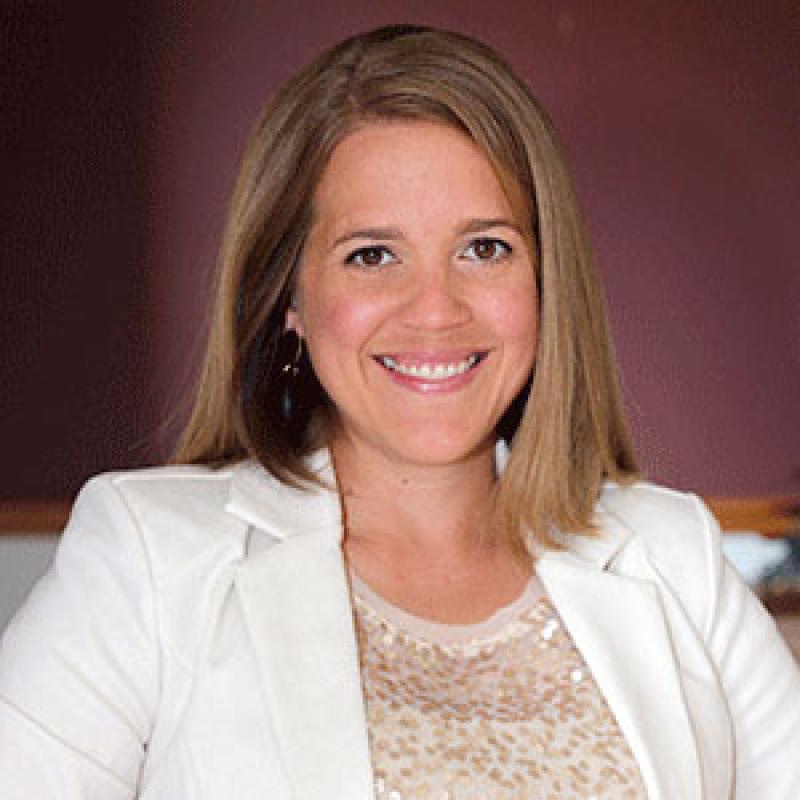Hearing impaired community struggles with life under COVID-19
Photo Courtesy of University of Illinois
Professor Sadie Braun poses for a professional headshot for the College of AHS. Braun calls on her 10 years of clinical experience and her knowledge of audiology to elucidate the struggles that the hearing-impaired community faces due to the COVID-19 pandemic.
September 28, 2020
While COVID-19 has completely up-ended every area of life, the pandemic has brought additional challenges for the hearing-impaired, including those on campus.
Sadie Braun is a clinical assistant professor in the Speech and Hearing Science Department, specifically in audiology. She had 10 years of clinical experience in hospitals before she came to the University to assist graduate students with hearing loss research.
“Masks are presenting a challenge for hearing impaired people in general for a number of reasons,” Braun said. “You wear your glasses, your mask and then people with hearing impairments wear their hearing aids as well. That’s a lot of stuff right there behind the ears. Physically, that can be a lot to manage.”
Around 30-40% of speech sounds are visible on the lips alone, Braun said.
With masks muddying visual cues, “That just makes it so much more difficult for them to understand with or without hearing aids,” she said. “Some of them (in the clinic), even with their hearing aids, are really struggling to hear us with the masks on, and sometimes we have to talk very loudly, and sometimes that still doesn’t help.”
Get The Daily Illini in your inbox!
Braun shared that using plastic face masks that are both CDC compliant and keep the mouth visible are “very helpful” for those hard of hearing.
“If you think about certain professions where people with hearing impairments may interact such as healthcare or essential workers at the grocery store, if they can be wearing that type of mask, it makes it so much easier,” she said.
For students in the hard of hearing community, Zoom classes are audibly challenging.
“Zoom thankfully has more visual cues,” Braun said. “However, you introduce a lot of variables that people with hearing impairments can’t control … and a lot of times they’re variables that are very troublesome for hearing such as interference from background noise or poor connection and the quality of the sounds of voices.”
Zoom is also not closed-captioned, though there are third-party companies that will offer closed captioning for Zoom or other services in real-time for a cost. In spite of charging a fee, these services are helpful for students or people who are hearing impaired and have to be in meetings often.
Braun said asynchronous classes are helpful wherever possible, in case the students “missed things and they can review on their own time.”
Furthermore, Braun shared that anyone who is struggling with hearing at this time should reach out to their audiologist because there is likely something that can be done.
“If someone has hearing aids but is struggling with meetings via Zoom, there are always accessories we can add to hearing aids to improve what we call the signal to noise ratio for the patient, such as a Bluetooth microphone that they can place in front of whoever is speaking,” Braun said.
Akhila Keeranoor, a freshman in Business, has a different kind of auditory challenge that has heightened with COVID-19. She suffers from sensory and auditory processing challenges, making her hypersensitive to certain sounds.
Chewing, yawning, unloading dishes and high frequencies are just a few of the soundbites that can feel torturous. Keeranoor is fully online for her first semester of college courses, and these sounds are harder than ever to avoid.
“What happens when I hear these sounds, (is that) it’s not just like a normal irritation, it goes way beyond that,” Keeranoor said. “It aggravates me to a point where I feel rageful and violent, or I just break down completely and want to cry. I just feel completely overwhelmed.”
She said that she tries to keep a fan on in her room and will use earplugs or noise-canceling headphones when her family is cooking.
“If I’m around people who are eating, I might lash out at them, and it might come out of nowhere,” Keeranoor said. “I think my parents are pretty understanding and know what’s going on, but still, it’s not the best reaction.”
The at-home environment, now standard with COVID-19, isn’t kind to her condition.
“Usually I’m able to get out and be on my own most of the time, I have more control of what I hear,” Keeranoor said. “Being cooped up at home has heightened my anxiety in general. When I’m more anxious, this gets worse.”
Though she said she has always experienced auditory sensitivity, she shared that she has just recently begun to understand it more, especially during this quarantine.
“I guess whenever I hear something going on at home, it’s hard to focus on my classes because my mind only goes to that sound and I can only focus on it,” she said. “So that’s hard. I think a classroom setting is just better than my house because my house is really small and it’s got terrible acoustics.”
Keeranoor explained that many, including her parents, think she takes things too seriously or over-dramatizes certain situations, and she often does not have someone whom she can share these feelings with.
“I think most people who have sensory processing issues also have something else going on,” she shared. “It’s a good idea, maybe, to speak to someone if you’re comfortable like a medical professional. I don’t think that’s much of the case with me, but that’s often the case. My advice (to people) would be don’t take offense if I’m getting away from you if you’re doing something that’s bothering me. It’s not personal.”
For University students in particular, DRES can provide additional support and accommodations for those who may be struggling with hearing impairments or sound sensitivity. However, DRES could not comment at this time.







